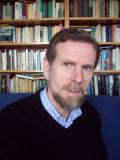Abstract:
This is a reflection occasioned by an impression of Aristotle’s irritation at the views of the Heracliteans. It offers a reflection that is inspired by, companioned by Heraclitus. It looks at aspects of the approaches of Hegel and Nietzsche as also taking a companioning approach. There is something resistant in Heraclitus’s mode of articulation that makes one diffident in (pro)claiming that now at last one is the privileged one to understand him. Heraclitus offers us striking thoughts that strike one into thought – that open up philosophical porosity to the deepest perplexities. In more detail, I will consider what is intended by flux-gibberish and how this bears on the determinacy and constancy of intelligibility. If some pervading sense of the flow of becoming must be granted, how does this bear on the constancy of intelligibility? How can we think the flow and the constancy together?
Speaker:

Prof. Desmond (1951) is one of the most well-known and influential contemporary Irish philosophers. He was awarded a BA in Philosophy and English (1972) and an MA in Philosophy (1974), at University College Cork, National University of Ireland. He obtained his PhD from Pennsylvania State University in 1978. He has taught at St Bonaventure’s, NY, University College Cork, NUI Maynooth (in 1981-82), and Loyola College in Maryland (1982-94) where he held the Thomas Higgins Chair of Philosophy. He moved to the Higher Institute of Philosophy at the Catholic University of Leuven in 1994, where he was Director of the International Programme in Philosophy for 13 years. Since 2005 he has held the David Cook Chair in Philosophy at Villanova University.
Most recently he was O’Malley Chair in the Bioethics Institute at Loyola Marymount University, Los Angeles. He has been a visiting professor at the Catholic University of America, and at Boston University, where he occupied the John N. Findlay Chair, and also at Boston College where he held the Gadamer Chair of Philosophy. He was also the Marsico Visiting Professor at the University of Denver. He has also been a visiting professor at the University of Beijing, Visiting Fellow in the Humanities at NUI Galway, Fellow of the Institute of Philosophy and Religion at Nottingham University and Distinguished Visiting Professor at the American University of Cairo. He has been honorary adjunct Professor at Maynooth University since 2009. He is an honorary lifetime member of the Irish Philosophical Society. An internationally respected Hegel scholar he was President of the Hegel Society of America (1989), President of the Metaphysical Society of America (1995) and President of the American Catholic Philosophical Association (2008). He was awarded an honorary doctorate by National University of Ireland, Maynooth University in October 2015.
He is the author of many books, including the ground-breaking trilogy Being and the Between (1995), Ethics and the Between (2001), and God and the Between (2008). Being and the Between was winner of both the prestigious Prix Cardinal Mercier and the J.N. Findlay Award for best book in metaphysics. Other books include Art and the Absolute (1986); Desire Dialectic and Otherness: An Essay on Origins (1987); Philosophy and Its Others: Ways of Being and Mind (1990); Beyond Hegel and Dialectic (1992); Perplexity and Ultimacy (1995); Hegel’s God (2003); Art, Origins, Otherness: Between Art and Philosophy also in (2003); as well as Is There a Sabbath for Thought?: Between Religion and Philosophy (2005). He has also edited five books and published more than 100 articles and book chapters. His book The Intimate Strangeness of Being: Metaphysics after Dialectic appeared in 2012, the same year in which the William Desmond Reader also appeared. His new book, The Intimate Universal: The Hidden Porosity among Religion, Art, Philosophy and Politics has recently appeared with Columbia University Press (2016).
Professor Desmond’s work is primarily in metaphysics, ethics, aesthetics and the philosophy of religion. In his pioneering trilogy, he has developed an original approach to the questions of metaphysics, that is both attentive to traditional possibilities while attempting to refresh the perennial perplexities of philosophy. Against a widespread critique or depreciation of metaphysics since Kant, Desmond has defended metaphysics as a living option.
